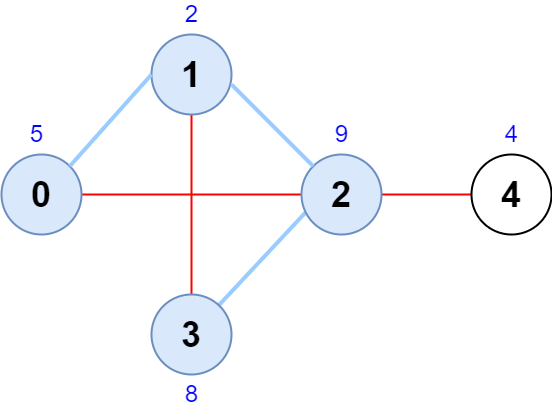LeetCode-in-Java
2242. Maximum Score of a Node Sequence
Hard
There is an undirected graph with n nodes, numbered from 0 to n - 1.
You are given a 0-indexed integer array scores of length n where scores[i] denotes the score of node i. You are also given a 2D integer array edges where edges[i] = [ai, bi] denotes that there exists an undirected edge connecting nodes ai and bi.
A node sequence is valid if it meets the following conditions:
- There is an edge connecting every pair of adjacent nodes in the sequence.
- No node appears more than once in the sequence.
The score of a node sequence is defined as the sum of the scores of the nodes in the sequence.
Return the maximum score of a valid node sequence with a length of 4. If no such sequence exists, return -1.
Example 1:

Input: scores = [5,2,9,8,4], edges = [[0,1],[1,2],[2,3],[0,2],[1,3],[2,4]]
Output: 24
Explanation: The figure above shows the graph and the chosen node sequence [0,1,2,3].
The score of the node sequence is 5 + 2 + 9 + 8 = 24.
It can be shown that no other node sequence has a score of more than 24.
Note that the sequences [3,1,2,0] and [1,0,2,3] are also valid and have a score of 24.
The sequence [0,3,2,4] is not valid since no edge connects nodes 0 and 3.
Example 2:

Input: scores = [9,20,6,4,11,12], edges = [[0,3],[5,3],[2,4],[1,3]]
Output: -1
Explanation: The figure above shows the graph.
There are no valid node sequences of length 4, so we return -1.
Constraints:
n == scores.length4 <= n <= 5 * 1041 <= scores[i] <= 1080 <= edges.length <= 5 * 104edges[i].length == 20 <= ai, bi <= n - 1ai != bi- There are no duplicate edges.
Solution
import java.util.Arrays;
@SuppressWarnings("java:S135")
public class Solution {
public int maximumScore(int[] scores, int[][] edges) {
// store only top 3 nodes (having highest scores)
int[][] graph = new int[scores.length][3];
for (int[] a : graph) {
Arrays.fill(a, -1);
}
for (int[] edge : edges) {
insert(edge[0], graph[edge[1]], scores);
insert(edge[1], graph[edge[0]], scores);
}
int maxScore = -1;
for (int[] edge : edges) {
int u = edge[0];
int v = edge[1];
int score = scores[u] + scores[v];
for (int i = 0; i < 3; i++) {
// if neighbour is current node, skip
if (graph[u][i] == -1 || graph[u][i] == v) {
continue;
}
for (int j = 0; j < 3; j++) {
// if neighbour is current node or already choosen node, skip
if (graph[v][j] == -1 || graph[v][j] == u) {
continue;
}
if (graph[v][j] == graph[u][i]) {
continue;
}
maxScore =
Math.max(maxScore, score + scores[graph[u][i]] + scores[graph[v][j]]);
}
}
}
return maxScore;
}
private void insert(int n, int[] arr, int[] scores) {
if (arr[0] == -1) {
arr[0] = n;
} else if (arr[1] == -1) {
if (scores[arr[0]] < scores[n]) {
arr[1] = arr[0];
arr[0] = n;
} else {
arr[1] = n;
}
} else if (arr[2] == -1) {
if (scores[arr[0]] < scores[n]) {
arr[2] = arr[1];
arr[1] = arr[0];
arr[0] = n;
} else if (scores[arr[1]] < scores[n]) {
arr[2] = arr[1];
arr[1] = n;
} else {
arr[2] = n;
}
} else {
if (scores[arr[1]] < scores[n]) {
arr[2] = arr[1];
arr[1] = n;
} else if (scores[arr[2]] < scores[n]) {
arr[2] = n;
}
}
}
}

